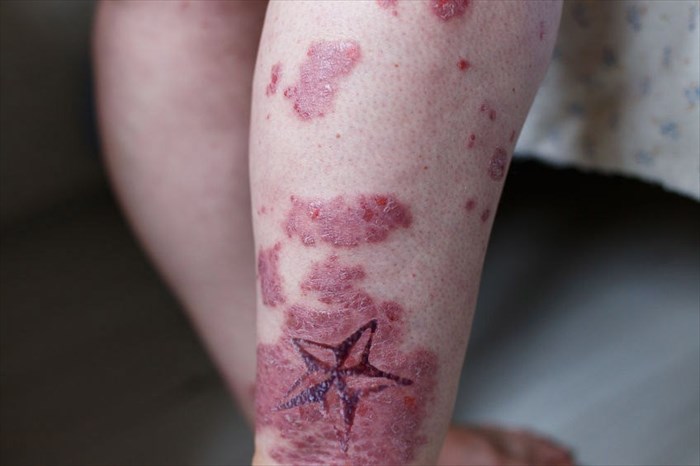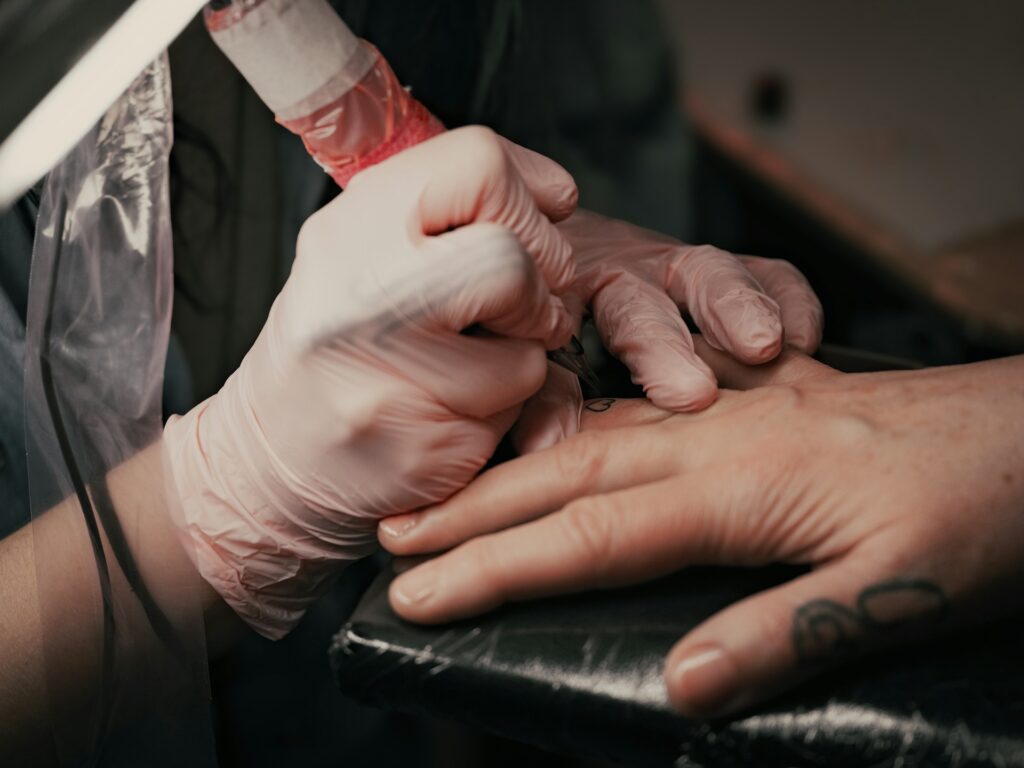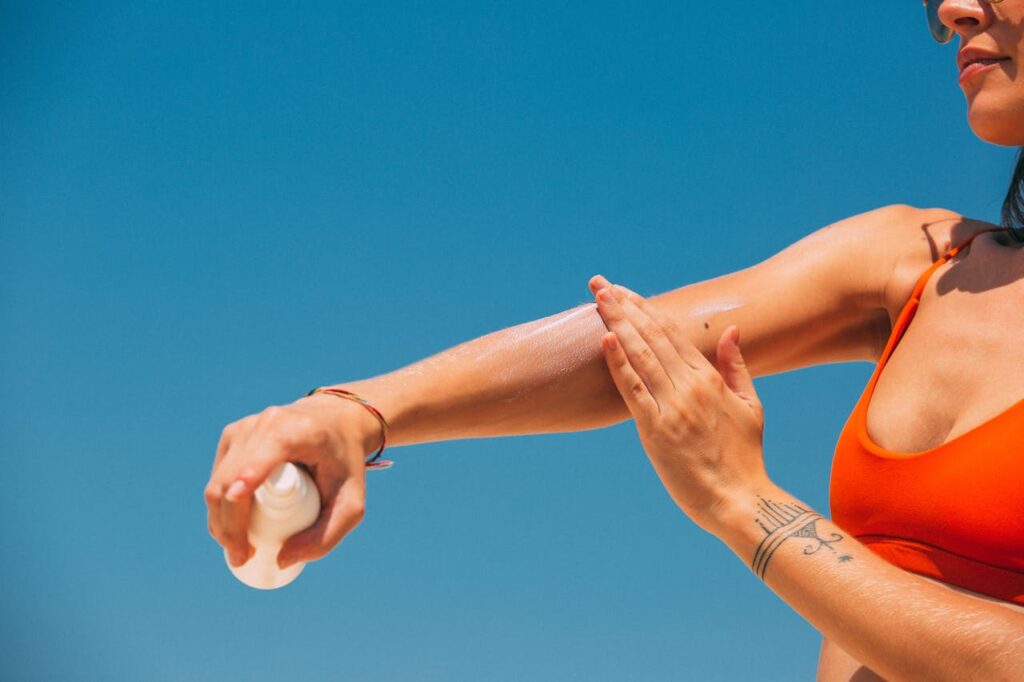Why Is My Tattoo Itchy?
Table of Contents

Photo credit: Healthline
Itchiness and a new tattoo are as common as peanut butter and toast. In most cases, you can’t have one without the other. So before you send yourself crazy constantly worrying about your itchy skin, just remember that this is what’s supposed to happen.
That itchy feeling you’re getting right now, it’s all part of the healing process. That doesn’t mean it’s not irritating or all-consuming – I definitely feel for you right now. But it’s not something you need to stress about. There are numerous reasons why your tattoo is itching right now, which I’ll get into in a moment. All of them are perfectly natural.
However, in some cases you may need to switch up your aftercare routine a bit to help the itchiness. So I’m also going to look at some other reasons why your tattoo might be itching and what you can do to relieve that annoying itchiness.
The most important thing you can do right now is to not scratch. Well, that and read this article. But definitely don’t scratch the tattoo or area around it. Scratching can cause a lot of problems, including increasing the risk of infection, distorting the tattoo and permanent scarring.
Why Is a Tattoo Itchy While It’s Healing?
Your skin needs to heal after getting a tattoo. It’s this healing process that causes your itchy skin. Getting inked requires needles to break or puncture your skin. Depending on how big your tattoo is, this could be a lot of puncturing at once. Afterwards, the wound takes time to heal, which triggers protective biological responses, such as scabbing and itching.
Depending on the size of your tattoo and your body’s healing process, this itching could last as long as three weeks.
Now, you might also notice some other elements of the healing process. These are also usually quite common and are part of your body’s immune response to protect the wound from getting infected or allowing germs in. Swelling, tenderness and a reddish or pinkish hue are all pretty common.
However, there are some other reasons why your tattooed skin might be itchy. These aren’t necessarily a cause to raise the alarm or seek medical attention. But it’s still good to be aware of them in case you need to change something about your tattoo aftercare routine.

Photo credit: Healthline
What Else Causes Tattoos to Itch?
You need to know why your tattoo itches when it’s healing so it can heal just right. There are a multitude of reasons it could be itchy, ranging from run-of-the-mill tattoo healing I’ve already covered all the way up to infections and allergic reactions.
Here are some of the more typical reasons why your tattooed skin would be itching. Take a look and have a think about whether any apply to you.
1. Allergic Reaction
Allergies are somewhat common because certain people’s skin doesn’t respond well to some of the pigments used in tattoos. Funnily enough, it’s the red tattoo inks that are the usual suspects when it comes to allergies from tattoos.
These allergic reactions can happen days, weeks or even years after getting a tattoo. If you think you’re having one, I recommend contacting your doctor or healthcare advisor. They’ll be able to prescribe anti-allergy meds, like topical steroidal creams.
2. Dry Skin
This is a pretty benign reason for itchiness and not at all surprising. The skin on and around your tattoo is likely going to get very dry.
That’s why your aftercare routine should involve regularly moisturizing with a fragrance-free and water-based moisturizer. If you think you might be allergic to the moisturizer you’re using, either change it for another one or get it checked by your doctor.
3. Sun Exposure
Good tattoo aftercare dictates that you don’t expose your tattoo to direct sunlight. If you do, you might experience an itchy rash within minutes or hours afterwards.
This rash can be a doozy, causing blisters, little acne-like bumps, redness and severe itchiness. The best way to avoid this is to use sunscreen, wear loose clothing or stay in the shade to keep your tattoo out of the sun.
4. Infection
Tattoo infections are rare, but they can happen. Especially if you’ve used a studio or artists that doesn’t maintain high hygiene standards. Infections can take a while to form, so you might feel itchiness related to one months after your tattoo. It could also be days afterwards.
The best way to know is if you can see pus in the tattoo, if you feel a fever or chills, or if there’s a lot of pain. You should see your doctor immediately if that’s the case. They’ll be able to prescribe antibiotics to help.

Photo credit: MyMed
5. Tattoo Ink Contamination
Your tattoo artist should be on top of this, but if their tattoo ink is contaminated with microorganisms, it could cause a rash, itching and pain even when you have a healed tattoo. This is another one to see your doctor about if you think it’s the cause of your itching.
6. Pre-Existing Skin Conditions
Underlying skin conditions, such as eczema or psoriasis, might reappear after getting a tattoo. This can happen after a few days but usually takes about 10-20 days to appear. If you think this is happening, make an appointment with a dermatologist to inspect the area.
7. Skin Cancer
Although somewhat rare, it is possible for skin cancer to form within the tattooed area. You can lower the risk of this by making sure you’ve had the area checked by a dermatologist beforehand. And definitely don’t get a tattoo over a mole if you can help it. If you’re worried about this, go see a dermatologist.
8. Sarcoidosis
Tattoo Sarcoidosis is really rare. It can sometimes manifest in tattoos. If it does, it will usually present as raised, itchy bumps. It’s more common in red tattoo ink than others. This is one to definitely see your doctor about if you think it’s happening.
8. A Recent MRI
More a situational itchiness than anything, getting an MRI can cause painful and itchy reactions in tattoos. Doesn’t matter if they’re new or old, you might feel a burning pain or itchiness. You might also get redness and swelling in the tattooed area.
You should let your doctor know about your concerns before getting an MRI. They might be able to offer an alternative or something to help the reaction.
Which Body Areas Itch Most from Tattoos?
There are certain areas of your body which may itch more when you get a tattoo. These are usually areas where you have more nerve endings, stretch more during movement, or get more sun exposure.
Some tattoo placements that might itch more include:
- Elbows, knees and stomach
- Spine, hands and feet
- Fingers, face and around or on genitals
- Shoulders and calves

Photo credit: Haberdoedas via Unsplash
How Can You Reduce Itching from Tattoos?
As I mentioned at the beginning of this article, reducing tattoo itching does not involve scratching it. You should never scratch your tattoo when it itches, not even if it’s been a few weeks since getting it. The integrity of any scabbing is important for the tattoo to heal well, so definitely don’t pick it off.
Instead, you should follow proper aftercare advice, which I’ve outlined briefly below. We also have a blog with more detailed information on how to take care of a tattoo. It won’t completely stop the itching, but it should prevent it from becoming unbearable. If you’re still experiencing itching, pain or any symptoms that cause concern, contact your doctor or dermatologist.
1. Proper Bandaging
Take your bandage off 2-3 hours after you get your tattoo and avoid re-bandaging it or wearing tight-fitting clothing over it. You don’t want any materials sticking to your skin while it heals.
2. Clean Hands, Always
Always wash your hands thoroughly before touching the area on or around your tattoo.
3. Pat, Don’t Rub
Use clean water and hands to cleanse the tattooed area. Only pat the area to dry it, never rub it.
4. Choose Safe, Approved Creams or Ointments
Apply an over-the-counter cream or ointment to the area. This could be a hydrocortisone cream, antihistamine cream or a vitamin A&D ointment. You should do this for the first five days, then switch to a fragrance-free moisturizer. Make sure you consult your tattoo artist or doctor to check which ones will be best for your skin.
5. Sun Protection
Always use sunscreen or loose clothing to cover the tattoo when you’re outside. This will protect it from UV rays. You shouldn’t let it see the light of day until about four or five weeks after.
6. Don’t Drown it in Water
Don’t excessively wet the tattooed area. I’m talking about baths, swimming or hot tubs. I know, all of those are great pastimes, but until your tattoo is fully healed, they’re off the menu. Just little bits of water on your hands to clean it from time to time.
7. Don’t Use Rubbing Alcohol
This one’s a big no-no. Hydrogen peroxide and rubbing alcohol should stay on the shelf. Only use water to clean the area.

Photo credit: Mikhail Nilov via Pexels
What Can You Do to Treat an Unbearably Itchy Tattoo?
If the itching is really unbearable and you don’t think it’s necessary to see a health professional, there are some at-home remedies you can use.
1. Cold Compress
Try placing a cool, damp cloth on the tattoo or itching area. You can also use an ice pack or something frozen (e.g. peas), but make sure it’s wrapped in a cloth or t-shirt. You should do this for 10-15 minutes at a time before taking a break for 30 minutes or longer.
2. Moisturizers or Ointments
These can help keep your skin hydrated and reduce itchiness. Hypoallergenic moisturizers or antibiotic ointments are best and, if possible, use one that you know doesn’t react badly with your skin. You should only apply a thin layer after washing the area. If you do this several times each day, it should reduce the itching.
Don’t Suffer an Itchy Tattoo
Look, getting a tattoo is going to cause some itchiness. There’s really no way around it. However, this shouldn’t be the kind of itchiness that makes you suffer.
Dealing with an itchy tattoo can be frustrating and uncomfortable, but at least now you know why. More importantly, you know what to do about it without compromising your beautiful artwork. However, if you’re ever feeling concerned that the itching, redness or rash might be more malignant than just the usual healing, seek immediate medical attention.
Things will turn out okay so long as you stay on top of it and follow the advice of professional and people who’ve been there, done that, and itched like no one’s business. This is just one of the steps of getting a tattoo. But before long, the itching will stop and you’ll be able to enjoy your new and healed tattoo in all its glory.
If you’re still trying to decide what tattoo to get, I recommend using our free AI tattoo generator. It’s a great tool that generates fantastic tattoo ideas based on your specific prompts. You can choose the type, style, colour and more. It might be a good starting place before you go to a studio to chat to a tattoo artist.